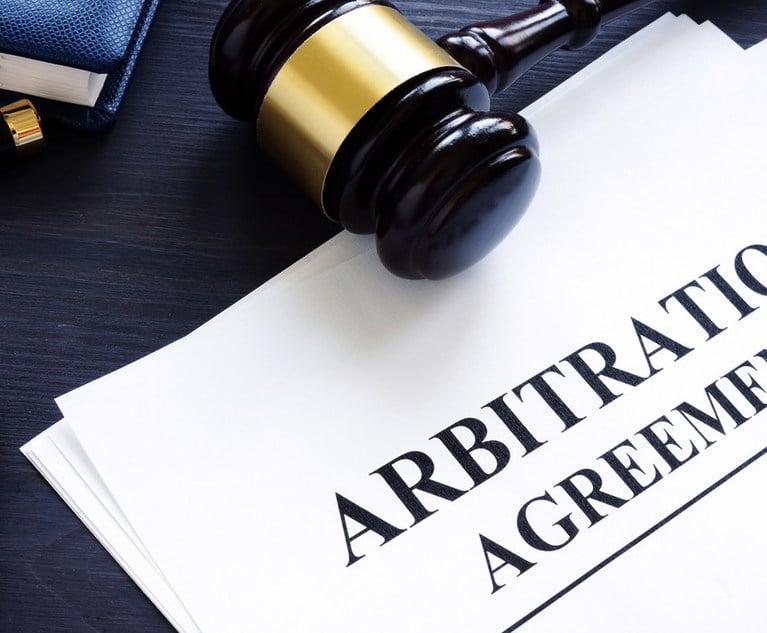The Expansive Scope of the New Anti-Arbitration Law
This article provides a discussion of the recently enacted Ending Forced Arbitration for Sexual Harassment and Sexual Assault Act, which makes unenforceable any pre-dispute arbitration agreement for any case filed that "relates to [a] sexual assault dispute or the sexual harassment dispute." As the author writes: This "relates to" language is not insignificant—it dramatically expands the scope of the law."
April 08, 2022 at 10:00 AM
9 minute read

On March 3, 2022, President Joe Biden signed into law the Ending Forced Arbitration for Sexual Harassment and Sexual Assault Act (the Act). The Act makes unenforceable any pre-dispute arbitration agreement for any case filed that "relates to [a] sexual assault dispute or the sexual harassment dispute." The guarantee of a judicial forum strengthens victims' claims by providing for a more fair and impartial fact finder, allowing for the broad discovery litigants are entitled to in court and removing the cloak of secrecy that comes with arbitration.
An initial and critical question for many lawyers—particularly for plaintiff's lawyers—has been whether the law applies retroactively or merely prospectively. The law addresses this issue at §3, stating: "This Act, and the amendments made by this Act, shall apply with respect to any dispute or claim that arises or accrues on or after the date of enactment of this Act." Although there has yet to be any judicial interpretation of this language, defense lawyers have been quick to argue that claims where sexual harassment had already occurred before the passage of the Act, including both pending litigation and pre-litigation matters, should remain subject to the terms of an arbitration agreement.
This content has been archived. It is available through our partners, LexisNexis® and Bloomberg Law.
To view this content, please continue to their sites.
Not a Lexis Subscriber?
Subscribe Now
Not a Bloomberg Law Subscriber?
Subscribe Now
NOT FOR REPRINT
© 2025 ALM Global, LLC, All Rights Reserved. Request academic re-use from www.copyright.com. All other uses, submit a request to [email protected]. For more information visit Asset & Logo Licensing.
You Might Like
View All
Artificial Wisdom or Automated Folly? Practical Considerations for Arbitration Practitioners to Address the AI Conundrum
9 minute read
Art of the Settlement: Trump Attorney Reveals Strategy in ABC Lawsuit

Evolving Legal Standards to Combat Disqualification of Arbitrators for Failing to Disclose Conflicts of Interest
8 minute read
Court of Appeals Holds that Arbitration Agreements Can Be Formed Through ‘Clickwrap’ Process
8 minute readLaw Firms Mentioned
Trending Stories
- 1Bill Would Consolidate Antitrust Enforcement Under DOJ
- 2Cornell Tech Expands Law, Technology and Entrepreneurship Masters of Law Program to Part Time Format
- 3Divided Eighth Circuit Sides With GE's Timely Removal of Indemnification Action to Federal Court
- 4Former U.S. Dept. of Education Attorney Suspended for Failure to Complete CLE Credits
- 5ArentFox Schiff Adds Global Complex Litigation Partner in Los Angeles
Who Got The Work
J. Brugh Lower of Gibbons has entered an appearance for industrial equipment supplier Devco Corporation in a pending trademark infringement lawsuit. The suit, accusing the defendant of selling knock-off Graco products, was filed Dec. 18 in New Jersey District Court by Rivkin Radler on behalf of Graco Inc. and Graco Minnesota. The case, assigned to U.S. District Judge Zahid N. Quraishi, is 3:24-cv-11294, Graco Inc. et al v. Devco Corporation.
Who Got The Work
Rebecca Maller-Stein and Kent A. Yalowitz of Arnold & Porter Kaye Scholer have entered their appearances for Hanaco Venture Capital and its executives, Lior Prosor and David Frankel, in a pending securities lawsuit. The action, filed on Dec. 24 in New York Southern District Court by Zell, Aron & Co. on behalf of Goldeneye Advisors, accuses the defendants of negligently and fraudulently managing the plaintiff's $1 million investment. The case, assigned to U.S. District Judge Vernon S. Broderick, is 1:24-cv-09918, Goldeneye Advisors, LLC v. Hanaco Venture Capital, Ltd. et al.
Who Got The Work
Attorneys from A&O Shearman has stepped in as defense counsel for Toronto-Dominion Bank and other defendants in a pending securities class action. The suit, filed Dec. 11 in New York Southern District Court by Bleichmar Fonti & Auld, accuses the defendants of concealing the bank's 'pervasive' deficiencies in regards to its compliance with the Bank Secrecy Act and the quality of its anti-money laundering controls. The case, assigned to U.S. District Judge Arun Subramanian, is 1:24-cv-09445, Gonzalez v. The Toronto-Dominion Bank et al.
Who Got The Work
Crown Castle International, a Pennsylvania company providing shared communications infrastructure, has turned to Luke D. Wolf of Gordon Rees Scully Mansukhani to fend off a pending breach-of-contract lawsuit. The court action, filed Nov. 25 in Michigan Eastern District Court by Hooper Hathaway PC on behalf of The Town Residences LLC, accuses Crown Castle of failing to transfer approximately $30,000 in utility payments from T-Mobile in breach of a roof-top lease and assignment agreement. The case, assigned to U.S. District Judge Susan K. Declercq, is 2:24-cv-13131, The Town Residences LLC v. T-Mobile US, Inc. et al.
Who Got The Work
Wilfred P. Coronato and Daniel M. Schwartz of McCarter & English have stepped in as defense counsel to Electrolux Home Products Inc. in a pending product liability lawsuit. The court action, filed Nov. 26 in New York Eastern District Court by Poulos Lopiccolo PC and Nagel Rice LLP on behalf of David Stern, alleges that the defendant's refrigerators’ drawers and shelving repeatedly break and fall apart within months after purchase. The case, assigned to U.S. District Judge Joan M. Azrack, is 2:24-cv-08204, Stern v. Electrolux Home Products, Inc.
Featured Firms
Law Offices of Gary Martin Hays & Associates, P.C.
(470) 294-1674
Law Offices of Mark E. Salomone
(857) 444-6468
Smith & Hassler
(713) 739-1250






